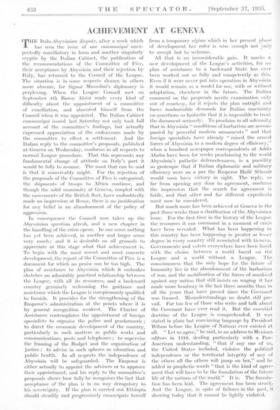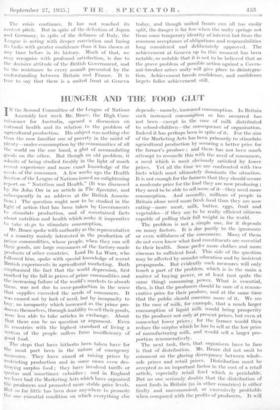ACHIEVEMENT AT GENEVA
THE Italo-Abyssinian dispute, after a week which has seen' the issue Of one coMmuniqice urieX- pectedly conciliatory in form and another singularlY cryptic by the Italian Cabinet, the publication of the recommendations of the Committee of Five, their acceptance by Abys§inia and their rejection by rtabr, has returned to the Council of the League. The situation is in some respects clearer, in others more obscure, for Signor Mussolini's diplomacy is perplexing. When the . League Council met on. September 4th Baron Aloisi made every kind of difficulty about the appointment of a committee Of conciliation, and absented himself from the COunCil 'When it was appointed. The Italian Cabinet
communiqué issued last Saturday not only took full account of the committee's . findings, but actually expressed appreciation of the endeavours made by the committee to effect a settlement. And the Italian reply to the committee's proposals, published at Geneva on Wednesday, conforms in all respects to normal League procedure. That this represents any fundamental change of attitude on Italy's 'part it would be folly to assume. The most that can be said is that it conceivably might. For the rejection of the proposals of the Committee of Five is categorical, the shipment's of troops to Africa continue; and though the solid unanimity at Geneva, coupled with the movements of the British fleet, have undoubtedly made an impression at Rome, there is no justification for any belief in an abandonment of the policy of aggression.
In consequence the Council now takes up the Abyssinian question afresh, and a new chapter in the handling of the crisis opens. In one sense nothing has yet been achieved, in another and larger sense very much ; and it is desirable on all grounds to appreciate at this stage what that achievement is. To begin with the most recent and most concrete development, the report of the Committee of Five is a document for which no praise can be too high, The: plan of assistance to Abyssinia which it embodies sketches an admirably practical relationship between the League, with all its resources, and a backward country genuinely welcoming the guidance and assistance which the League is conspicuously qualified to furnish. It provides for the strengthening of the Emperor's administration at the points where it is by general recognition weakest. The Charter of Assistance contemplates the appointment of foreign specialists to organise the police and gendarmerie to direct the economic development of the country, particularly in such Matters as public N-1,orks and communications, posts and telephones ; to supervise the framing of the Budget and the, organisation of justice ; to advise in such spheres as education and public health. In all respects the independence of Abyssinia will be safeguarded. The Emperor is either actually to appoint the advisers or to approve their appointment, and his reply to the committee's proposals shows how fully he recognises the fact that acceptance of the plan is in no way derogatory to his sovereignty. If the plan is carried out Ethiopia should steadily and progreS•sively emancipate herself
from a temporary regime which in her present phase Of development her ruler is wise enough not :only to accept but to welcome. All that is no inconsiderable gain. It marks
new development of to League's activities„. for no plan of assistance to ,a backward State has. e,v.er, been worked, out so fully and competently as: this. Even if it were never put into operation in Abyssinia it would remain as a model for use, with or without adaptation, elsewhere, in the future. The Italian comment on the proposals merits examination only out of courtesy, for it rejects the plan, outright and bases inadmisSible demands, for Italian suzerainty on assertions so fantastic that it is impossible to treat the document seriously. To proclaim in all solemnity that in Abyssinia " conditions of barbarism are accom- panied by powerful modern armaments " and that foreign specialists have already, " raised the armed forces of Abyssinia to a modern degree of efficiency," when a hundred newspaper correspondents at Addis Ababa have been for weeks proclaiming to the world Abyssinia's pathetic defencelessness, is a puerility so grotesque that if Italian diplomatic and military efficiency were on a par the Emperor Haile Selassie would soon have victory in sight. The reply, so far from opening any door to agreement,, confirms the impression that the search for agreement is futile, and that other and far different expedients must now be considered.
But much more has been achieved at Geneva in the past three weeks than a clarification of the Abyssinian issue. For the first time in the history of the League the resources it can command in a moment of crisis have been revealed. What has been happening in this country has been happening in greater or lesser degree in every country still associated with Geneva. GOvernments and voters everywhere have been faced with the choice between a world based on the League and a world without a League. The consciousness that the only hope for the future of humanity lies in the abandonment of the barbarism of war, and the mobilisation of the forces of mankind against any nation that still insists on waging it has made more headway in the last three months :than in all the years that have passed since the Covenant was framed. Misunderstandings no doubt still pre- vail. vail. Far too few of those who write and talk about the Covenant have ever read it. But the essential doctrine of the League is comprehended. It was
stated in plain but convincing language by President Wilson befOre the League of Nations ever existed at
all. " Let us agree," he said, in an address to Mexican editors in 1918, dealing particularly with a Pan- American understanding, " that if any one of us, the United States included, violates the political independence or the territorial integrity of any of the others all the others will jump on her," and he
added in prophetic words "that is the kind of agree- ment that will have to be the foundation of the future
life of the nations of the world." It is. The founda- tion has been laid. The agreement has been struck.. And the League, in spite of failures in the past, is showing today that it cannot be lightly violated. 044.13411oad ApA'ssaaxau ao `443atinoioaaun pun S3.4m33 .104440 s! (sa"a4unoa aatno su) untliati tt! spool 4sotu o tioRnya4sm 041 1014 gam& poo,J I sqqnop 'atto ou 4nEf • arplqs".1001 s! tu4a1 Aultpadsa `04044.t1 111340a 133o lsoo 044 ui aolovj 3u134.xodull u13 stt pa4daoau aq ;swat uoRnq4.14sta •saatad utnaa putt saa'ad ains -aiotEAt uao:Nag Aattudaaasip 8ut.11342 aq). uo latannuoa 04 4p110 4ott pip aanau %TN uo44nq".14stp jo 41341 s! 00133 04 0n131[ S.losiurato '413q4 `uatil `315134 4i011 041 .SiaAtittiountual -0.1d aa1113f .13 Ilanpu'l4 jo °°Pd 'mot 0114 313 Has Of 'soriTt 04 itoitutt snldans 044 0atipaa pool sup:1.ms Eu!Soal .io s3n34 poApAut 0A134 ADM. Putn2ua samIsqns satugatuos pug 0nb -sap uoAO S0Sl3 autos tu! putt uoponpoad 2t.141394saT Sq saapd 2utsut.t 413 Patt'Iu 0A1311 AaqS4 'sains1334/ icaua2.10tua jo • aanou 910-ui uaaq laud 4501.0 0113 a0J, 6A13.1.1 u0)4r4. uaaq' 04.1343411 a4.1314 41344 sda4s atit *P0,0.1 . ipoo.3 jo icauataujnsut tuOJJ saajjns aidoad alp 119!40as 2m/tit jo p ' 134s 4s0142'4 a44 !ma sa4a4u1100. tit . aupu















































 Previous page
Previous page